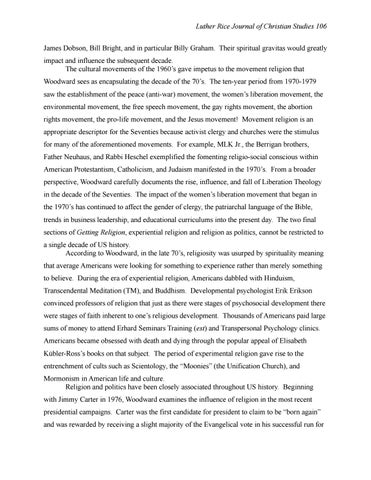Luther Rice Journal of Christian Studies 106 James Dobson, Bill Bright, and in particular Billy Graham. Their spiritual gravitas would greatly impact and influence the subsequent decade. The cultural movements of the 1960’s gave impetus to the movement religion that Woodward sees as encapsulating the decade of the 70’s. The ten-year period from 1970-1979 saw the establishment of the peace (anti-war) movement, the women’s liberation movement, the environmental movement, the free speech movement, the gay rights movement, the abortion rights movement, the pro-life movement, and the Jesus movement! Movement religion is an appropriate descriptor for the Seventies because activist clergy and churches were the stimulus for many of the aforementioned movements. For example, MLK Jr., the Berrigan brothers, Father Neuhaus, and Rabbi Heschel exemplified the fomenting religio-social conscious within American Protestantism, Catholicism, and Judaism manifested in the 1970’s. From a broader perspective, Woodward carefully documents the rise, influence, and fall of Liberation Theology in the decade of the Seventies. The impact of the women’s liberation movement that began in the 1970’s has continued to affect the gender of clergy, the patriarchal language of the Bible, trends in business leadership, and educational curriculums into the present day. The two final sections of Getting Religion, experiential religion and religion as politics, cannot be restricted to a single decade of US history. According to Woodward, in the late 70’s, religiosity was usurped by spirituality meaning that average Americans were looking for something to experience rather than merely something to believe. During the era of experiential religion, Americans dabbled with Hinduism, Transcendental Meditation (TM), and Buddhism. Developmental psychologist Erik Erikson convinced professors of religion that just as there were stages of psychosocial development there were stages of faith inherent to one’s religious development. Thousands of Americans paid large sums of money to attend Erhard Seminars Training (est) and Transpersonal Psychology clinics. Americans became obsessed with death and dying through the popular appeal of Elisabeth Kübler-Ross’s books on that subject. The period of experimental religion gave rise to the entrenchment of cults such as Scientology, the “Moonies” (the Unification Church), and Mormonism in American life and culture. Religion and politics have been closely associated throughout US history. Beginning with Jimmy Carter in 1976, Woodward examines the influence of religion in the most recent presidential campaigns. Carter was the first candidate for president to claim to be “born again” and was rewarded by receiving a slight majority of the Evangelical vote in his successful run for
Luther Rice Journal of Christian Studies, Spring 2019, Volume 3

Issuu converts static files into: digital portfolios, online yearbooks, online catalogs, digital photo albums and more. Sign up and create your flipbook.
